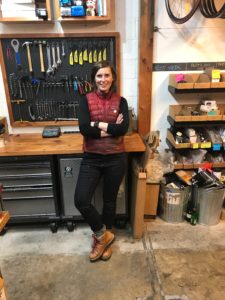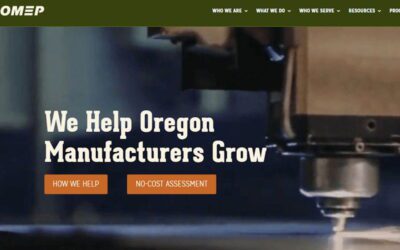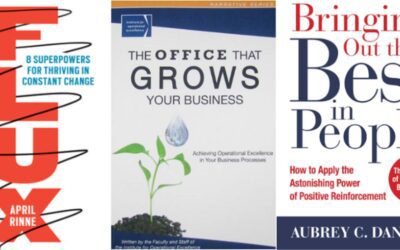Jude recently joined OMEP as our first ever Account Executive. The team is excited to have her on board! Like most of our staff, Jude is a maker, innovator, and creator with deep experience in manufacturing. Whether you’re a seasoned leader or new to manufacturing, the lessons Jude learned along her journey as founder of Sugar Wheel Works, her manufacturing company, hold value.
In 2008, while on a 3-month long bike ride through Patagonia, I decided to act on a business idea—to be a custom hand-built bicycle wheel builder. Like all of my adventures, this idea was not well thought out and the success of my business is owed to endless grit, a great team, and learned lean efficiencies through my partnership with OMEP.
THE BEGINNING (OR, WHAT NOT TO DO)
During the foundational years I was a classic case of what not to do. I worked incredibly long hours, didn’t take time to work on the business, didn’t take care of myself, and didn’t believe I could execute on an ambitious strategy. At the time I worked with a variety of well-intentioned consultants that just didn’t seem to take the time to really understand my pain points or how a micro-manufacturing business operated. Instead, they would offer up generalized business advice that was really difficult for me to apply in my specific business. The wrong consultants at the wrong time added to the anxiety I had about getting my business model to a sustainable point.
FINDING STABILITY
Things began to change when I learned how to manage cash flow, which gave me some breathing room. I saw first-hand how inefficiently I was running my business. Through this new understanding, I created contingency plans and useful forecasting models. I also signed up for a lean fundamentals class that OMEP was teaching at Prosper Portland.
Before the class, I had a vague sense of what lean was but didn’t realize how it would radically shift how I thought about my business. Implementing the lessons learned in the class was a slow process, and the culture shift happened gradually, but it gave me the chance to do things differently.
LEAN LESSONS LEARNED
Lesson one: Experiment Often
 I was afraid to try new things because I had a fear of looking foolish in front of my staff and advisory board. As a small business owner, the underlying message I believed was that resources will always be thin so choose a strategy wisely. This meant that I often led my staff into analysis paralysis because I wanted to choose the “Right” strategy.
I was afraid to try new things because I had a fear of looking foolish in front of my staff and advisory board. As a small business owner, the underlying message I believed was that resources will always be thin so choose a strategy wisely. This meant that I often led my staff into analysis paralysis because I wanted to choose the “Right” strategy.
Shifting the culture to one of curiosity and learning from missteps in the spirit of uncovering new ways to overcome challenges didn’t come without growing pains. Old habits die hard.
Yet, once we were able to adapt, we had better conversations about the challenges we were facing and we grew as a team. We also honored measuring the experiments we undertook so that they didn’t seem haphazard.
While we had many “wins” in the shop, we also became a trusted partner for component manufacturers—they appreciated our dedication to continuous improvement systems, quality, and our curiosity about their products.
Lesson Two: Possibility and Freedom
Like most small business owners, I had come to accept that I would be working 60+ hours a week and constantly thinking (and worrying!) about the business. Engaging in process improvement meant that I could trust my system to produce reliable results throughout the business. That included administrative tasks, production and sales.
When things went off the rails the team could talk about a process improvement instead of individual actions.
The impact to our business was tangible. We were able to achieve work/life balance because we understood production times and could accurately schedule projects. We also learned how to scope and price projects so that they were profitable.
Our customers were delighted by the fact that we were usually on time.
Lesson three: Cash Flow Through Inventory Management
As a small business owner I didn’t realize that through controlling inventory bin levels I could significantly increase the cash flow in my business.
Understanding the root cause of my inventory issues and modeling out a future state helped me to confidently approach and re negotiate with my suppliers. Not only was I able to negotiate a better price, I also negotiated better shipping times.
I also set up a Kanban system for specific items which freed my time to work on other efficiency projects (or leave early to go for a bike ride).
Before understanding the lean process, I had resigned myself to working countless hours managing systems, quality, and people. With continuous improvement as the underlying philosophy in my business model, I increased monthly cash flow by several thousand dollars through better inventory management. We reduced the time necessary to close a sale, and were able to work predictable hours (something I didn’t dream was possible a year prior!)
My experience was one of empowerment. Lean principles and a continuous improvement mindset allowed me to empower my staff to create a culture of curiosity and experimentation. Although I sold the business in 2019, I carry these lessons with me today, and strive to live them out when working with Oregon manufacturers.



